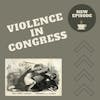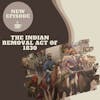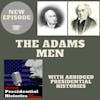Violence in Congress

Tensions were high in the run-up to the Civil War. Disagreements proliferated about the institution of slavery and just what should be done about it. And nowhere were disagreements and tempers high than inside the halls of Congress.
While many know about the caning of Charles Sumner, some may be surprised to learn that this was just one in a long line of violent acts conducted by members of Congress.
Tune in this week as I dive into the history of congressional violence. And when you're done, be sure to tell me what you want to learn about as we get closer to covering one of the most impactful moments in United States history: the Civil War.
SOURCES
“Bitter Feelings in the Senate Chamber.” United States Senate. (LINK)
Freeman, Joanne B.. The Field of Blood: Violence in Congress and the Road to Civil War. United States: Farrar, Straus and Giroux, 2018.
Sumner, Charles. “The Crime Against Kansas: The Apologies for the Crime. The True Remedy.” Speech. May 19th and 20th, 1856. Courtesy of the United States Senate. (LINK)
“The Caning of Charles Sumner.” United States Senate. (LINK)
“The Crime Against Kansas.” United States Senate. (LINK)
“The Kansas-Nebraska Act.” United States Senate. (LINK)
Wood, Margaret. “A Duel with Rifles.” Library of Congress. July 17, 2003. (LINK)
“An Act to Prohibit the Giving or Accepting within the District of Columbia, of a challenge to fight a duel, and for the punishment thereof.” February 20, 1839. 25th Congress, Session III, Chapters 28-30. Courtesy of the Library of Congress: A Century of Lawmaking for a New Nation: U.S. Congressional Documents and Debates, 1774 - 1875. (LINK)
“The next Congress will be the most violent one in our history. If violence and bloodshed come, let us not falter, but do our duty, even if we fall upon the floors of Congress.” Henry Wilson, 1855.
Welcome to Civics and Coffee. My name is Alycia and I am a self-professed history nerd. Each week, I am going to chat about a topic on U.S history and give you both the highlights and occasionally break down some of the complexities in history; and share stories you may not remember learning in high school. All in the time it takes to enjoy a cup of coffee.
INTRO MUSIC
Hey everyone, welcome back.
Imagine for a moment, if you will, running for and being elected to Congress. A crowning achievement, you might begin to make your preparations to move to the nation’s capital and start trying to figure out how you will operate within a new city with new colleagues. Of course you anticipate there will be members with whom you will disagree with, but would it ever cross your mind that these new co-workers may be the cause of your death? Well, that was the reality in the middle of the nineteenth century as the country inched its way toward war.
And while many history buffs are likely familiar with the notorious caning of Charles Sumner in 1856, some may not realize that this was just one in many a fight to break out on the floors of Congress.
So this week, I am diving into the history of violence in Congress. How far back did it go? What prompted it? And what caused it to end?
Grab your cup of coffee, peeps. Let’s do this.
As the quote from the start of the episode indicates, tensions throughout the country were running at an all time high over the stark differences of opinion over what to do about that peculiar institution, slavery. The southern part of the country had long come to rely on the use of free labor to cultivate their crops and as the country expanded further west, the question of whether slavery should expand along with the nation’s borders prompted contrasting opinions. And while slavery proved to be the ultimate divider, tensions in Congress had been building for years.
Beginning as early as the 1830s, members of Congress were less than cordial with each other. Original tensions and disagreements typically emanated out of party loyalty, but the cause quickly shifted to slavery in the 1840s. While all members spent the legislative session in DC, they came from all corners of the country and a variety of backgrounds, education, and life experience. Washington was still a city in the making and comforts were few and far between. Even the chambers of Congress, a place most history nerds consider hallowed ground, was an uncomfortable, stifling space. A time before central air and lacking any natural ventilation through windows, members of Congress would crowd together, often in the oppressive DC heat, to debate laws and, as emotions ran high, each other.
This forced proximity brought to light the stark differences of fellow members and was further exacerbated by the free flowing booze enjoyed by most members of the chamber. Free flowing alcohol meant often that patience was low and tempers short. A well known issue in Congress, the drink led to both external altercations and self harm as several congressmen took their own lives while under the influence. Honor was another major factor in the early disputes amongst representatives as this was a period where there was no greater insult to a man than to claim he lacked honor or courage. To threaten a man’s honor was to invite a duel.
An overwhelmingly southern practice, dueling involved two men, several of their closest friends, and a few doctors if they were lucky.Meeting at an agreed upon location at a certain time. The men would then turn in opposite directions, walk a set number of paces, and spin around to prepare to fire their weapons. Given the technology of the time, duels frequently required several shots as misfires or poor aim meant the dueling partners missed their intended target. To add to the insanity, the friends on site would meet in between rounds to try to negotiate a peaceful and agreeable end to the violence without requiring another shot fired. And if you’ve seen Hamilton, or have listened to prior episodes, then you know that dueling often ended in the death of one of the participants, with Alexander Hamilton dying prematurely at the hands of Aaron Burr in 1804.
Southern representatives who grew up in a world of dueling and defending honor, were quick to challenge their northern counterparts at the earliest sign of insult. Having little exposure to the practice, and believing it to be a bit barbaric, northern representatives sought to avoid interactions that might prompt a challenge. This proved to be rather difficult as southerners, unused to dealing with any direct criticism of slavery, were quick to go into a rage whenever the topic came up. To them, attacking slavery was akin to assaulting their honor. Watching bills head to the floor or hearing speeches critical of their economic way of life was simply unacceptable. As they saw it, they were sent to Congress by their community and failing to stem the attacks on something so pivotal to their way of life meant they were being derelict in their duty.
And though tensions were high over the slavery issue, it turns out that the most deadly disagreement in Congress was over an article in the newspaper. Appearing in the Whig friendly New York Courier and Enquirer in February, 1838, the article accused Democratic congressmen of corruption. The article failed to mention the supposed culprits of the corruption, but even the unsubstantiated charge was enough to raise the ire of Virginia representative Henry Wise who demanded a full investigation into the matter. Another representative, Jonathan Cilley from Maine, remarked an investigation was overkill, insinuating the editor of the paper was not entirely ethical in his operations.
Word of Cilley’s remarks made it back to the editor of the newspaper, James Webb, who asked yet another member of Congress, William Graves to deliver a note to Cilley. Cilley refused to receive the note and things quickly deteriorated from there, leading to Graves issuing the challenge to a duel in defense of honor. Up against a corner, Cilley felt he had no choice but to accept the summons. Thus, planning for a meeting of the two representatives commenced. The two representatives settled on a location, just outside DC limits, and a date, February 24th. As a northerner, Cilley found himself at a distinct disadvantage and, despite friends attempts to find a peaceable solution to the disagreement, Graves won the duel - successfully shooting Cilley who did not recover from his injuries.
The death of a member of congress sent shockwaves throughout the district, prompting the Senate to introduce yet another law to curtail the practice. The proposed law made it illegal for anyone to challenge or accept a duel within DC limits and made it a felony for anyone involved in the transportation of challenges. Despite attempts at closing existing loopholes, rowdy congressmen itching for a fight often found a way to defend their honor.
As fights over party loyalty faded into the background and slavery became the issue of the day, Congress tried a half measure to avoid conflict by instituting a gag rule preventing the discussion of all petitions relating to slavery. One man who rankled the feathers of many, but who somehow managed to escape the brutality was former president John Quincy Adams. Adams was a staunch abolitionist and was incensed over the gag rule. He spent his time in the house pushing the limits of this rule, and more than one representative made a comment about wishing Adams harm. However, as the son of a founding father, former president, and lifelong public servant, Adams held a bit of gravitas even of those who secretly wished him harm and he served his entire tenure without a hand or cane raised against him.
But Adams was the exception and not the rule. In debates over the details of the compromise of 1850, Mississippi Senator Henry Foote became so enraged about comments made by his colleague from Missouri, Thomas Benton, that he drew a gun and charged towards the Senator. In what feels like a scene straight out of a political drama, Benton apparently bared his chest on and yelled in the chamber of having no weapons saying, quote: “stand out of the way and let the assassin fire,” end quote. This scene was memorialized in newspapers throughout the country, who depicted the dramatic scene via a sketch published far and wide.
The progression and evolution of the media did little to diminish tensions. As technology developed, newspapers were able to publish the events and words of the day with rapidly growing speed. For members of Congress, this meant they were always on heightened alert to defend their honor and that of their constituents. For average Americans, this led to diminishing faith and trust in the effectiveness of the federal government. In her analysis of violence in Congress, historian Joanne Freeman wrote quote: “national institutions of all kinds were under fire at precisely the moment when their influence most mattered,” end quote.
Despite the fact that these men were elected to develop solutions to the nation’s problems in what was supposed to be the most deliberative body in the country, they too frequently missed the mark. However, they did, for better or worse, represent the values and feelings of their constituents. Instead of being censured and expelled from Congress for brawling, members were often celebrated and re-elected by overwhelming margins. And so, representatives and senators continued to dance a tense tango, skirting the lines of civility instead of tackling the issues of the day. This precarious dance remained fraught, leading to one of the most well known episodes of violence in Congress.
As the United States acquired new territory and continued its expansion west, there was an ever growing need to organize and develop the land to make it suitable for settlement and travel. Hoping to build a transcontinental railroad, Illinois Senator Stephen A Douglas introduced a bill he hoped would facilitate said development. Known today as the Kansas-Nebraska Act, the proposal effectively repealed the Missouri Compromise of 1820, which banned slavery north of the 36th parallel, replacing it with what he called popular sovereignty. No longer would there be hard lines containing the spread of slavery. Instead, territories would vote to decide whether to permit the institution within its borders. This created quite an outrage, and led to civil unrest in the Kansas territory for several years, more commonly known as Bleeding Kansas.
Since slavery could be decided by a vote of the residents of the area, both abolitionists and slavery supporters flooded the territory, hoping to stuff the ballot box with enough votes to achieve victory for their side. Accusations of fraud and dishonorable conduct added kindling to an already roaring flame and several people were injured and lost their lives in the crosshairs.
It was in this climate that Charles Sumner rose to give a speech on the floor of Congress that was a full throated repudiation of the Kansas-Nebraska Act, the men behind it, and the institution of slavery. A freshman Senator out of Massachusetts, Sumner took advantage of the pervasive media coverage, preparing a copy of his speech for the press before he even spoke a word. And so over a five hour period between May 19th and May 20th, Sumner delivered a fiery assault against slavery, saying quote: “it is the rape of a virgin territory, compelling it to the hateful embrace of slavery and it may be clearly traced to a depraved longing for a new slave state, the hideous offspring of such a crime, in the hope of adding to the power of slavery in the national government,” end quote. Sumner did not hold back, going after Douglas and South Carolina Senator Andrew Butler.
Butler was not in the chamber as Sumner attacked his character which was a major violation of etiquette. Sumner’s words made it to Representative Preston Brooks, who was a cousin of Butler and also representing the state of South Carolina. Upon hearing the speech, Brooks became enraged at the audacious temerity of the northern yankee for attacking his cousin and his state and decided to exact his revenge. Just a few days later, on May 22, 1856, as Sumner sat at his desk, Brooks attacked. Wielding a cane, the Representative from South Carolina pounded his target over and over again, refusing to stop until the cane snapped. Sumner, measuring over six feet tall, was stuck in his desk, which was bolted to the floor, and had no means to escape.
It took several minutes for the chaos to stop and Sumner had to be carried out of the chamber to seek medical attention. His injuries were extensive and Sumner would not return to his seat permanently until 1859. The beating of a sitting Senator on the floors of Congress felt like a snapshot for the rising tensions of the country and both sides of the political aisle used it to advance their cause. For southern sympathizers, Brooks was simply defending the honor of his family and his state. For the north, the beating was touted as yet another example of the brutality inflicted upon the nation as the result of slavery.
The distrust and fear escalated to the point that by 1860, a majority of members of congress carried pistols. Not to use them to attack anyone, but in full anticipation of needing it for self-defense. Historian Joanne Freeman argues that it was this violence and chaos, in part, that helped propel the then nascent Republican party into victory. The violence also had another effect: northerners were now prepared to fight back. For years, northern representatives had proactively tried to avoid conflicts with their southern colleagues, hoping to escape the barrel of a gun from a duel. However, as concessions were made in the spirit of compromise, northern and abolitionist residents grew frustrated with the perceived lack of courage on display by their representatives. Thus, by the mid 1850s, those elected to congress from the north made sure voters knew they would no longer back down from a challenge.
This came to a head when Abraham Lincoln was elected in 1860. Though southern states had hinted loudly about secession, many thought this was just another bullying tactic to get their way. Of course, as we all know, it wasn’t just talk.
Unfortunately, it took the secession of states and the outbreak of civil war to put a stop to the violence in Congress. As southern states left the union in droves, their numbers dwindled, leading to a bit of a super majority of northern, abolitionist legislators. Devoid of antagonists, a sense of normalcy descended upon Congress - or as much normalcy one can expect while legislating during civil war. By the time the country came back together and southern states rejoined the union, much of the bravado and explosive anger subsided.
There have been a few spats since then, including a brawl in 1902 over the annexation of the Philippines on the Senate floor. However, physical altercations in the halls of Congress between members is overwhelmingly a thing of the past and they no longer have to worry that a wrong phrase or choice of topic will elicit a violent response. Though I am going to go out on a limb here and say that while it is nice to know they won’t cane each other, there is still much left to be desired when it comes to congressional relationships.
Peeps, we are getting closer and closer to one of the most significant events in United States history - the Civil War. I can’t believe it is almost time. As I’ve mentioned before, I am not a historian of war and therefore will not be covering individual battles or military strategy. There are a few key moments and people from the war I know I want to dive into, but here is your chance to tell me what you want to hear about. Is there something specific from the Civil War you’ve always been curious about and would like me to cover? Let me know. You can find me on all of the socials - including Thread - or through my website at www dot civics and coffee dot com. I can’t wait to hear from you.
Thanks, peeps. I’ll see you next week.
Thanks for tuning and I hope you enjoyed this episode of Civics & Coffee. If you want to hear more small snippets from american history, be sure to subscribe wherever you get your podcasts. Thanks for listening and I look forward to our next cup of coffee together.
OUTRO MUSIC
Listener Favorites
Not sure where to begin? Take a listen to some fan favorites.

























